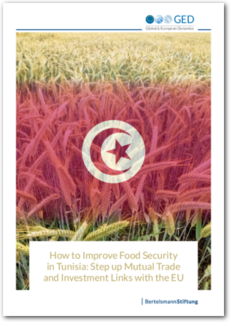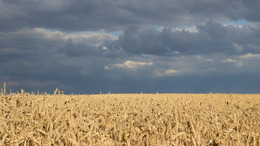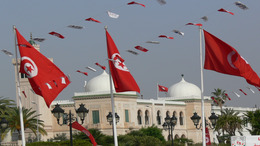"The close ties clearly show that the EU would also benefit if Tunisia were to be more secure economically and socially", explains Christian-P. Hanelt, Middle East expert at the Bertelsmann Stiftung. Around 75 percent of Tunisian exports are shipped to the EU, and 50 percent of its imports originate there. Approximately one million of Tunisia’s 12 million citizens have left their native country and are living and working in Europe. "That’s why it’s worth taking a more detailed look at the close economic, financial and social ties between Tunisia and the European Union. And the agricultural sector is an important lever for overcoming the country’s current difficult situation", Hanelt says.
The agricultural sector contributes 14 percent to Tunisia’s gross domestic product and employs roughly 17 percent of the country’s workforce. One of its most important products is olive oil. In the past decade, Tunisia produced more than 197,000 tons of olive oil each year on average, making the country the globe’s fourth largest producer behind Spain, Italy and Greece. Yet some Tunisian agricultural products are subject to EU trade restrictions, which is why only 56,700 tons of its olive oil can be exported to Europe duty-free.
"There are many agricultural products, such as olive oil, tomatoes and dates, which still have untapped export potential", explains Houssem Eddine Chebbi, professor of agricultural economics at the Ecole Supérieure des Sciences Economiques et Commerciales in Tunis. "Tunisia has a number of possibilities for further increasing its product range and export volumes in the European market."
The experts’ following recommendations could help European and Tunisian decision makers create a more resilient agricultural sector in Tunisia:
- The duties laid out in the 1998 trade agreement between the EU and Tunisia should be adapted to reflect current developments. What is important here is that players in the Tunisian agricultural sector analyze the relevant potentials and suggest proposals to the European Commission. Brussels should demonstrate an openness to change, especially when it comes to increasing or eliminating quotas. As this is a sensitive subject, when negotiations begin again or past agreements are revisited, not only should the EU and the Tunisian government be involved, so should representatives of Tunisia’s agricultural sector.
- Significant untapped potential exists when it comes to exports of products such as olive oil, tomatoes and dates. At the same time, however, the goal must be to produce a sufficiently diverse range of agricultural goods. Strategic, data-driven risk management is crucial here.
- Tunisia has been discussing a modernization of its agricultural sector in light of climate change. Infrastructure upgrades, sustainable processing of products and more efficient water management will play a major role in this effort. These tasks should be supported by the EU both financially and technically. Small farmers and local civil society should be included as they can assist in developing agricultural resources.
- If, through no fault of its own, Tunisia experiences additional shortages due to Russia’s war against Ukraine, the EU should provide the country with short-term financial support. This would help cushion the impact of excessive price hikes and problems sourcing supplies.
![[Translate to English:] Bildmontage - Weizenfeld, auf das die tunesische Flagge projiziert wurde](/fileadmin/files/_processed_/9/4/csm_286567047AdobeStock_361654509_KONZERN_ST-EZ_bearb_89fa13d23f.jpg)





![[Translate to English:] Karte des Mittelmeers mit Anrainerstaaten](/fileadmin/files/_processed_/5/1/csm_800352798panthermedia_B240537112_ST_EZ_bear_d2a611b6a7.jpg)


